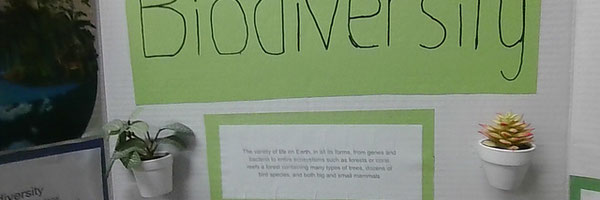Microscopic Biodiversity in the Bow River
Grade 6
Presentation
Problem
We were comparing samples from two types of water to see what different organisms and how many orginisms there are between still and moving water. We guessed that the still water would have more microorganisms because of the vegetation in the area and the conditions of the water.
Method
Our method was to collect the water from moving water ( the bow river) and still water (a pond in bowmont). We put a small drop of water onto a slide and looked through a microscope to identify what we saw. We had 3 slides from each water sample. Then we compared what we saw on the microscope and compared it to a similar microorganism picture online. If we agreed it was that organism we found online we charted it down.
Research
Our research project introduces Biodiversity and the different organisms between still and moving water. The research helped us find what different organisims were in the water and why there were more organisms in the still water then the moving water. The research also helped because it gave us more details about the topic and the different types of biodiversty. Our research included our samples, our observations of the area of where we got our samples, Google image searches and talking with our science teacher.
Data
Bow River / moving water Scroll down Bowmont / still water
Slide 1 Slide 1
Spirochates Water Mold Euglena Euglena Spirochaetes Water Mold
Slide 2 Slide 2
Concentric Rings Euglena Marine microbes Proteobacteria Spirochaetes Stained Bacteria
Slide 3 Slide 3
Bacillius Water Mold Euglena Euglena Water Mold
Conclusion
We found out that there are more organisms in still water than moving water. This is likely because of the vegetation and the wildlife that surrounds the still water. The moving water had less microorganisms because it likely had less nutrients near the river rock bottom and it was very shallow.
We also realized that we collected our still water sample from a water filtration system. A future study could look at water from the start of the system and comparing it to water at the clean part of the system and see how much the system cleaned the water from the start. Another future study could also see what microorganism causes th most harm and what causes the least amount of harm to other living things.
We thought we would see about 20 organisms but there were way more. There were a lot of microrganisms that we could not identify. To solve that we could find experts who study these type of different organisms. We could get also a better microscope to find out better details.
Citations
https://en.wikipedia.org/wiki/Bacilli
https://storymd.com/journal/m7xeada0pw-bacteria/page/y4rqgecdg5l5-proteobacteria
https://ocean.si.edu/ocean-life/microbes/marine-microbes
Acknowledgement
We want to acknoledge Ms.James (our science teacher) becuase she gave us time and materials to work on our project.
We also acknowledge our parents for giving us ideas and guiding us throughout our project.

